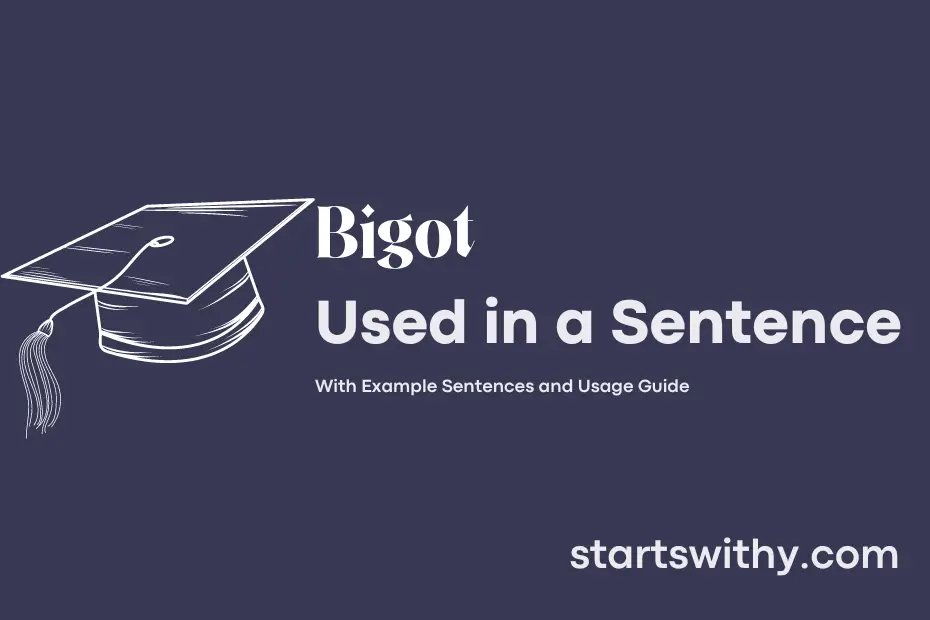Have you ever encountered someone who displayed prejudice or discrimination towards others based on their beliefs or characteristics? That person could be described as a “bigot.” A bigot is someone who holds strong, intolerant views about a group of people and is unwilling to consider or accept different opinions.
Such individuals often exhibit narrow-mindedness and may actively promote hostility or unfair treatment towards those they perceive as different from themselves. Recognizing bigotry can help in promoting inclusivity and understanding among diverse groups. Let’s delve deeper into this issue and explore ways to challenge and overcome prejudice in our society.
7 Examples Of Bigot Used In a Sentence For Kids
- Bigot means someone who doesn’t like people who are different.
- It’s not nice to be a bigot because we should be kind to everyone.
- We should always treat others with kindness, even if they are a bigot.
- It’s important to stand up against bigotry and treat everyone equally.
- Let’s be friends with everyone and not be a bigot.
- We should always be fair and not judge others for being different, that is what a bigot does.
- We should be proud of our diversity and not let bigots make us feel bad.
14 Sentences with Bigot Examples
- Avoid engaging with bigots on social media platforms to maintain a positive online presence.
- It is important to challenge bigotry in academic discussions to promote a respectful learning environment.
- Seek advice from a counselor if you encounter bigotry that affects your mental well-being.
- Participate in awareness campaigns to educate others about the harmful effects of bigotry.
- Engage in conversations with classmates to challenge bigots and promote acceptance and inclusivity.
- Report any incidents of bigotry or discrimination to the appropriate authorities or college officials.
- Take part in workshops and seminars that address bigotry and how to combat it effectively.
- Support student-led initiatives that aim to raise awareness about bigotry and prejudice.
- Avoid associating with individuals known for their bigoted views to maintain a positive social circle.
- Use your platform as a student to speak out against bigotry and advocate for equality and respect.
- Encourage open discussions in classrooms to address bigotry and promote tolerance among peers.
- Stand up for classmates who may be targets of bigotry and offer your support.
- Educate yourself on the various forms of bigotry to recognize and address them in different situations.
- Engage in collaborative projects with diverse groups of students to combat bigotry and promote unity within the college community.
How To Use Bigot in Sentences?
To Bigot is to hold intolerant or prejudiced views about a particular group of people. When using Bigot in a sentence, it is important to understand its meaning and context. Here is a guide for beginners on how to use Bigot effectively:
-
Understanding the meaning: Before using Bigot in a sentence, make sure you know what it means. A Bigot is someone who is narrow-minded, intolerant, or prejudiced towards those who are different from them.
-
Choosing the right context: Bigot is a serious term that should be used thoughtfully. Make sure the context of your sentence fits the definition of someone displaying intolerance or prejudice.
-
Creating a sentence: When constructing a sentence with Bigot, you can say something like, “He is a bigot who refuses to accept people of a different race.” This sentence clearly demonstrates someone who is intolerant towards individuals based on their race.
-
Avoiding stereotypes: Be mindful not to use Bigot in a way that perpetuates stereotypes or promotes hate speech. It is important to use the term responsibly and accurately.
-
Reflecting on the impact: Consider the impact of using Bigot in your sentence. Think about how it may affect others and whether it accurately reflects the behavior or attitudes you are describing.
By following these guidelines, beginners can effectively use Bigot in a sentence to convey intolerance or prejudice towards a particular group of people.
Conclusion
In conclusion, the sentences provided with the keyword “bigot” serve as clear illustrations of prejudiced and intolerant attitudes. From discriminatory behavior towards individuals of certain cultural backgrounds to closed-minded opinions about marginalized groups, these sentences highlight the harmful impact of bigotry. It is evident that bigotry can lead to harmful stereotypes and divisive attitudes that foster discrimination and inequality in society.
By recognizing and challenging bigotry in our own beliefs and actions, we can work towards a more inclusive and accepting world. Ultimately, it is crucial to promote understanding, empathy, and respect for all individuals, regardless of their differences. Overcoming bigotry requires a commitment to openness, education, and embracing diversity to create a more equitable and harmonious society for everyone.



